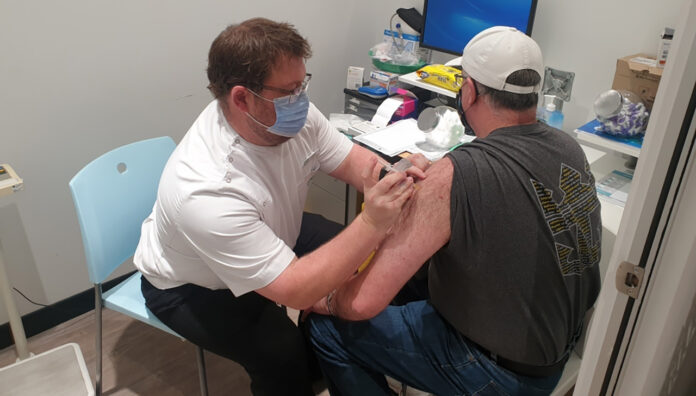From back-to-back boosters to constant queries about rapid antigen tests (RATs), pharmacists are under more strain than ever. So Australian Pharmacist has some tips from psychological experts to help cope with the chaos.
On the New South Wales Central Coast, Dale Richardson MPS says the situation at his pharmacy, which began administering the COVID-19 vaccine to children aged 5–11 last week, is ‘very challenging’.
‘A lot of staff have been either sick with COVID-19 or are household contacts who need to isolate,’ he said.
‘It’s very draining. When I went home on Saturday after work I [felt] more tired than I have in a long time.’
Other pharmacy staff also feel the pressure, which isn’t helped by the demands of some patients.
‘The staff who worked [last week] were pulling the weight of an extra person,’ Mr Richardson said.
While some patients understand the pressures pharmacists are under, he said others ‘ just don’t get it’.
‘Some people complain about wait times [when] I’m busy doing booster shots and looking after other things,’ he said.
TIPS TO MAINTAIN WELLBEING with Sahra O’Doherty, Psychologist and Board Director of the Australian Association of Psychologists:
|
Preserving mental health
Executive Office of the Pharmacists’ Support Service (PSS) Kay Dunkley MPS said that while the volume of calls to the PSS has remained steady, it is the intensity of some which concerns her.
‘Some calls [are from] pharmacists who are extremely distressed,’ she said. ‘People are at their wits’ end, feel completely drained and don’t know how they’re going to get up the next day.’
Even during busy periods, pharmacists should aim to take breaks during the day, and get out of the pharmacy where possible, Ms Dunkley said.
‘[Head to] the tearoom, or somewhere that’s away from the front of the [pharmacy], and sit down, eat and nourish yourself,’ she said.
Healthy foods such as fruit and nuts that you can snack on should also provide a boost.
When pharmacists are on a break, Ms Dunkley recommends giving patients options such as having their medicine delivered, getting a phone call when it’s ready or coming back at a certain time.
Some pharmacies reduce business hours or close on public holidays to cater for staff shortages. The pandemic sub-register also allows for extra staff to reduce the burden.
But it is the little things that boost morale among staff, Ms Dunkley said, such as shouting everyone a round of coffees or bubble tea.
‘I know one pharmacy owner [who] packs treats into the dispensing robot that come out periodically during the day,’ she said.
An open workplace culture in which staff feel comfortable to raise issues or share when they are having a hard time is also important.
‘If one person raises an issue, others [often] bring up similar experiences,’ Ms Dunkley said.
‘So it’s helpful to discuss things in meetings and work out strategies for managing particular issues, with everyone having a chance to contribute ideas and thoughts.’
TIPS TO MAINTAIN YOUR WELLBEING with Jill Newby, Associate Professor at the Black Dog Institute:
|
Close encounters of the unpleasant kind
When pharmacists or pharmacy staff have an unpleasant patient encounter, Ms Dunkley said a good approach is to leave the floor for a few minutes to regroup with some breathing exercises, such as ‘box breathing’.
‘You breathe in for 4 seconds, hold for 4 seconds, breathe out for 4 seconds, hold for 4 seconds and repeat that cycle,’ she said. ‘It slows your heart rate and gives you time to calm down before you have to speak to the next person.’
When the pressure is on, Mr Richardson advises staff to ‘take the time to do the job at hand’.
‘People can wait. Don’t [worry] what others think of you, and don’t think you’re less of a pharmacist just because you can’t handle what’s going on at the moment,’ he said.
When negative feelings creep back in, Ms Dunkley advises vocalising how you feel.
‘That’s when talking to colleagues, family, friends or PSS can be helpful,’ Ms Dunkley said.
‘Talking things through can change your perspective, particularly if it’s with someone who’s outside the situation.’
In addition to PSS, pharmacists can access services including:
- the Black Dog Institute Essential Health Network resources and ‘Support for your Profession’ sections
- Hand-n-Hand provides an outlet for health professionals to discuss how they are coping
- PSA’s Pharmacist to Pharmacist Advice Line for help and support.



 Dr Peter Tenni[/caption]
Dr Peter Tenni[/caption]
 How should we deprescribe gabapentinoids, according to the Maudsley Deprescribing Guidelines[/caption]
How should we deprescribe gabapentinoids, according to the Maudsley Deprescribing Guidelines[/caption]



 Pharmacists have always prescribed, but they have the potential to prescribe much more
Pharmacists have always prescribed, but they have the potential to prescribe much more





